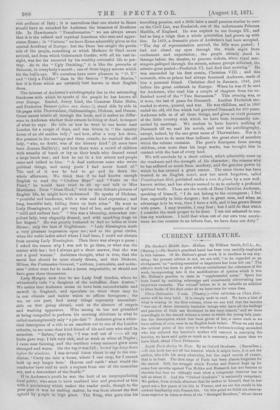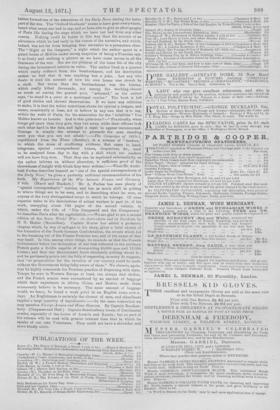Inside Paris dining the Siege. By an Oxford Graduate. (Macmillan.)
—If this book has not all the interest which it might have, it is not the author, who tells his story admirably, but the rapid course of events, that is in fault. The first siege of Paris has been almost forgotten for the second. Still, the struggle which Trochu and Duorot kept up for some four months against Von Moltke and Bismarck has not become so obsolete but that we willingly read what a competent observer has to toll us about it. And the " Oxford Graduate" is eminently competent. We gather, from certain allusions that he makes to himself, that he has spent not a few years of his life in Framer), and we see the result in iliF5 evident familiarity with French life. On this point we think his observa- tions superior in value to those of the " Besieged Resident," whose clever letters formed one of the attraotions of the Daily News during the latter part of the war. The "Oxford Graduate" seems to have gone everywhere, heard what every one had to say, and so been able to give us photographs of Paris life during the siege whieh we have not had from any other source. Nothing could ho better in this way than his account of an adventure which he had early in the course of the narrative, and which, indeed, was not far from bringing that narrative to a premature close. The "Night at the Outposts," a night which the author spent in a guard-house of Mobiles under strong suspicion of being a Prussian spy, is as lively and striking a *tare as we have come across in all the literature of the war. Nor are the pictures of the inner life of the city during the investment inferior in value. The author lived in a quarter which really suffered from the bombardment, and his description makes us feel that it was anything but a joke. Let any who doubt it road his account of how his own house was struck by a shell. But worse than the bombardment was the famine, which really killed thousands, not among the working-classes so much as among the genteel poor, "ashamed," as the author says, "to stand in a queue at a municipal =Jane." The book is full of good stories and shrewd observations. If we have any criticism to make, it is that the writer sometimes shows too cynical a temper, and seems, occasionally at least, not to believe in any one, that is to say, within the walls of Paris, for his admiration for the " " Von Moltke knows no bounds. And is this quite true ?—" Practically, when troops get more than they give, they run away, while their officers look each other hard in the false, and light a cigar to appear unconcerned. Courage is simply the attempt to persuade the man standing next you that you are not afraid."--The Campaign of 1870-1, republished from the Times (Bentley), is a volume of "leaders," in which the mass of conflicting evidence that came to hand, telegrams, special correspondents' letters, despatches, &e., used to be analyzed from day to day with a skill which our readere will not have forg Aten. That they can be reprinted substantially, as the author informs us, without alteration, is sufficient proof of the shrewdness of insight with which they were written:—When Mr. Archi- bald Forbes describes himself as "one of the special correspondents of the Daily News," he gives a perfectly sufficient recommendation of his book. My Experiences of the War between France and Germany. 2 vols. (Hurst and Blaokett.) Mr. A. Forbes has seen plenty of "special correspondent's" service, and has as much skill in getting to where things are to be seen, and in describing what he sees, as anyone of the very distinguished corps to which be belongs. Of oven superior value to his descriptions of actual warfare is part iv. of his work, occupying about 140 pages of the second volume, in which, under the title of "The Conquered and the Conquerors," he describes Paris after the capitulation.—We are glad to see a second edition of the Seven Ilieeks' War : its Antecedents and its Incidents, by II. N. Hozier (Macmillan). Captain Hozier has added a prefatory chapter which, by way of epilogue to his story, gives a brief sketch of the formation of the North-German Confederation, the events which led to the breaking out of the Franco-Prussian war, and of the cause of that war itself. In this, among other things, ho reminds us that the French Government before the declaration of war had collected in the northern French ports a flotilla capable of transporting 40,000 men and 12,000 horses ; and that our Government knew absolutely nothing about it ; and he pertinently points out the folly of supposing, as many do suppose, that "no preparations for the invasion of our country could be made without the Government being fully aware of them." We observe, again, that he highly commends the Prussian practice of dispensing with tents. Troops, he says, in Western Europe at least, can always find shelter, and the French armies wore encumbered by an amount of baggage which their experience in Africa, China, and Mexico made them erroneously believe to be necessary. The same amount of baggage would, we fancy, be found a weak point in an English army now-a- days. An Englishman is certainly the cleanest of men, and cleanliness implies a largo quantity of impedimenta.—In the same connection we may mention Foreign Armies (end Home Reserves. By Captain Bracken- bury. (Chapman and Hall.) Captain 13rackenbury treats of Continental armies, especially of the forces of Austria. and Russia ; but 110 part of his volume will be rend with greater interest than that in which he speaks of our own Volunteers. They could not have a shrewder and more kindly critic.































 Previous page
Previous page